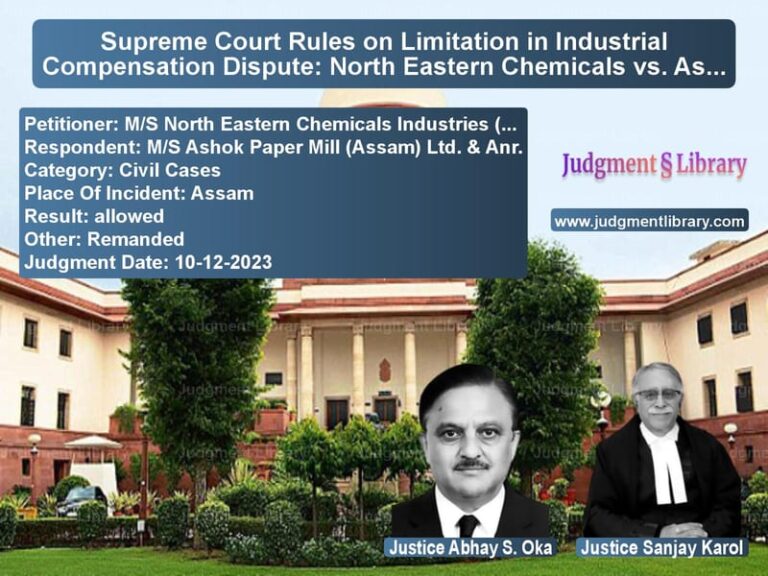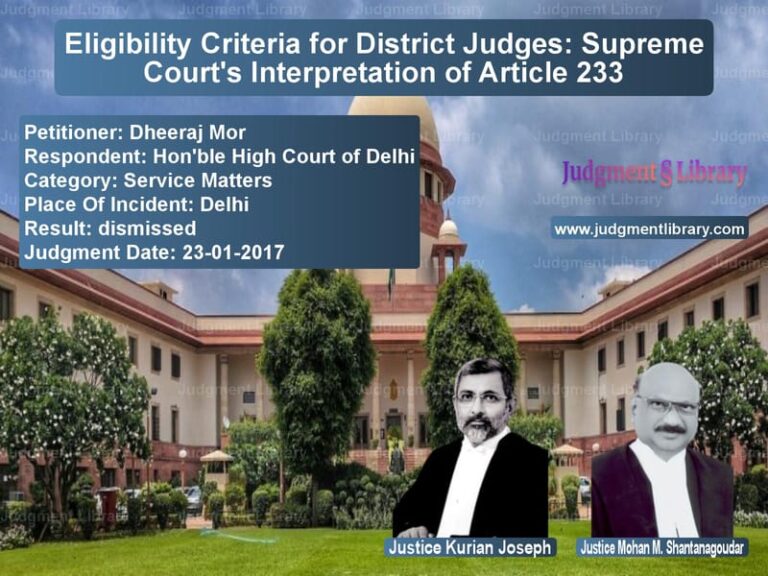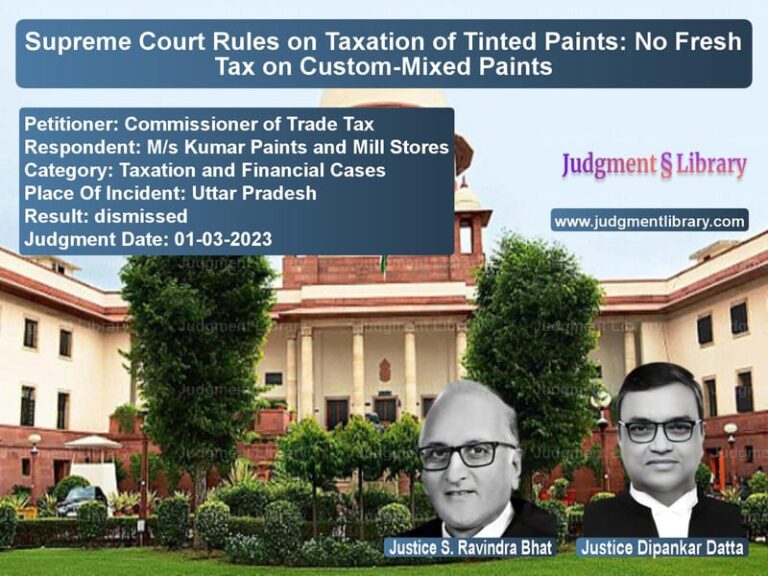Supreme Court Affirms Acquittal in Etawah Mass Murder Case Due to Lack of Evidence
The Supreme Court of India, in its judgment dated May 2, 2017, in the case of State of Uttar Pradesh vs. Sunil, upheld the acquittal of the accused in the mass murder case that took place in Etawah, Uttar Pradesh. The Court ruled that the prosecution had failed to establish a complete chain of evidence to prove the guilt of the accused beyond a reasonable doubt. This ruling reinforces the principle that circumstantial evidence must be compelling and conclusive for conviction.
Background of the Case
The case pertains to a brutal crime committed on the night of September 2, 2000, in which five members of a family, including the complainant’s parents and two sisters, were murdered in their home in Etawah, Uttar Pradesh. The complainant, Rekha Sengar (PW-2), received a call from her mother shortly before the incident, informing her that her brother-in-law, Suresh Pal Singh, had come to their house demanding Rs.50,000. Upon refusal, he and his friend, the accused Sunil, allegedly became violent.
The next morning, Rekha Sengar discovered the bodies of her family members and their pet dog. The police arrested Suresh Pal Singh on September 4, 2000. During interrogation, he allegedly confessed to the crime and implicated Sunil, leading to Sunil’s arrest. The trial court convicted Sunil based on circumstantial evidence and sentenced him to death. However, the Allahabad High Court set aside the conviction and acquitted the accused. The State of Uttar Pradesh then appealed to the Supreme Court.
Legal Issues Examined
The Supreme Court considered several critical legal questions:
- Whether the prosecution had established a complete chain of circumstantial evidence linking the accused to the crime.
- Whether the ‘last seen together’ theory was sufficient to convict the accused in the absence of direct evidence.
- Whether the High Court was justified in overturning the trial court’s conviction.
- Whether adverse inference could be drawn from the accused’s refusal to provide fingerprints and palm impressions.
Arguments by the Appellant (State of Uttar Pradesh)
- The State argued that Sunil was last seen with the co-accused, Suresh Pal Singh, near the victim’s house on the night of the incident.
- The prosecution contended that Sunil’s refusal to provide his fingerprints and palm impressions should be treated as an adverse inference against him.
- They emphasized the recovery of a blood-stained knife and clothing from the accused, asserting that it pointed to his involvement in the crime.
Arguments by the Respondent (Sunil)
- The defense argued that there was no direct evidence linking Sunil to the crime.
- The prosecution failed to prove that the blood-stained knife belonged to the accused.
- There was no independent witness to corroborate the claim that Sunil was last seen at the crime scene.
- The High Court had correctly found that the circumstantial evidence was insufficient to sustain a conviction.
Supreme Court’s Observations
The Supreme Court carefully reviewed the trial court’s proceedings and the High Court’s judgment. Key observations included:
- The ‘last seen together’ theory, by itself, was insufficient to establish guilt beyond a reasonable doubt.
- The prosecution failed to prove that the circumstantial evidence formed a complete chain leading only to the conclusion that Sunil committed the crime.
- The alleged recovery of a blood-stained knife and clothes was not substantiated by independent evidence.
- The accused’s refusal to provide fingerprints and palm impressions, though suspicious, could not be the sole basis for conviction.
Final Judgment
The Supreme Court ruled in favor of the respondent, upholding the High Court’s decision to acquit Sunil. The key rulings included:
- Suspicion, however strong, cannot take the place of proof.
- The accused’s right against self-incrimination under Article 20(3) of the Constitution protected him from being compelled to provide fingerprints and palm impressions.
- In cases based on circumstantial evidence, the prosecution must establish an unbroken chain leading to the sole hypothesis of guilt.
- The judgment and order of conviction passed by the trial court were set aside.
Implications of the Judgment
This ruling has significant implications for criminal law and the burden of proof in cases based on circumstantial evidence:
- Reinforcement of the Burden of Proof: The prosecution must prove guilt beyond a reasonable doubt, particularly in circumstantial evidence cases.
- Limitations of the ‘Last Seen Together’ Doctrine: Being last seen with the victim does not automatically imply guilt.
- Protection Against Wrongful Conviction: The judgment underscores the need for courts to exercise caution when convicting based solely on circumstantial evidence.
- Right Against Self-Incrimination: The Court reaffirmed that an accused cannot be forced to provide evidence against themselves.
Conclusion
The Supreme Court’s ruling in State of Uttar Pradesh vs. Sunil highlights the fundamental principles of criminal justice, emphasizing that conviction must be based on conclusive proof rather than mere suspicion. By affirming the High Court’s acquittal of the accused, the Court reinforced the doctrine that circumstantial evidence must be unimpeachable and complete for a conviction to stand. This judgment sets an important precedent for cases where evidence is purely circumstantial.
Don’t miss out on the full details! Download the complete judgment in PDF format below and gain valuable insights instantly!
Download Judgment: State of Uttar Prade vs Sunil Supreme Court of India Judgment Dated 02-05-2017.pdf
Direct Downlaod Judgment: Direct downlaod this Judgment
See all petitions in Murder Cases
See all petitions in Attempt to Murder Cases
See all petitions in Custodial Deaths and Police Misconduct
See all petitions in Judgment by Pinaki Chandra Ghose
See all petitions in Judgment by Rohinton Fali Nariman
See all petitions in dismissed
See all petitions in Stayed
See all petitions in supreme court of India judgments May 2017
See all petitions in 2017 judgments
See all posts in Criminal Cases Category
See all allowed petitions in Criminal Cases Category
See all Dismissed petitions in Criminal Cases Category
See all partially allowed petitions in Criminal Cases Category







